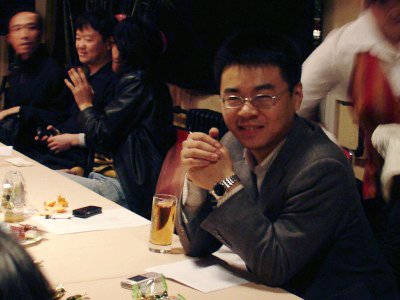The Mindmeters website was founded in May 2003, originally as an online magazine providing space for contributions made to the Book Review supplement of the Economic Observer weekly (english). In Chinese the name of the website is 思维的乐趣, sī wéi de lè qù, The Delights of Thinking. The wonderful english title was coined by Qin Liwen, then senior reporter at EO, now head of Sohu’s News Center. One and a half years later, in October 2004, the core of the Mindmeters website was changed into a group weblog.
After the majority of Mindmeters’ contributors, something like 10 senior writers, left Economic Observer in the summer of 2005 out of frustration with the paper’s narrowing intellectual scope, Mindmeters became an independent weblog and one of the most interesting experiments in independent group publishing I know of.

The spiritus rector of Mindmeters is Fang Jun (方军), Beijing-based management expert and now head of Sohu.com’s culture department (picture above). The portfolio of contributors includes people like Wu Xiaobo (吴晓波), whose history of New China’s early entrepreneurs is considered to be the best treatment of this subject; Xu Zhiyuan (许知远), renowned essayist and designated biographer of Hongkong tycoon Li Ka-Shing; journalist and writer Zou Bo, (邹波) or Ye Ying (叶滢), head of the Lifestyle department at Economic Observer.
Originally there were less than 10 founding members, now the number of listed members is up to more than 50, but still there are no more than around 10 highly active contributors. The topics range from management theory and history to architecture or arts and literature. There is no commercial ambition in the project, it’s for fun and only for fun. New contributors are recruited like in a very restrictive club: they have to be friends of members.
Even though the members see Mindmeters as a way of sharing their ideas, you will find very little visible discussion between them. The comments come mostly from outsiders, even in the articles themselves other authors are rarely mentioned. When asked about this strange phenomenon, they might say: “We tend to discuss our contributions over lunch or dinner.”
There are no explicit guidelines, everyone is responsible for their own entries. Even the site’s topical banner can be changed by everyone. Of course, Fang Jun is checking the site regularly to make sure there is no crossing the boundaries of decency, political or otherwise, but mostly the blog is a great and courageous attempt in free, distributed thinking and writing.


